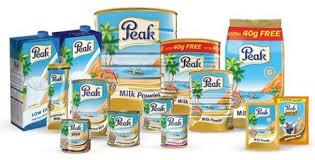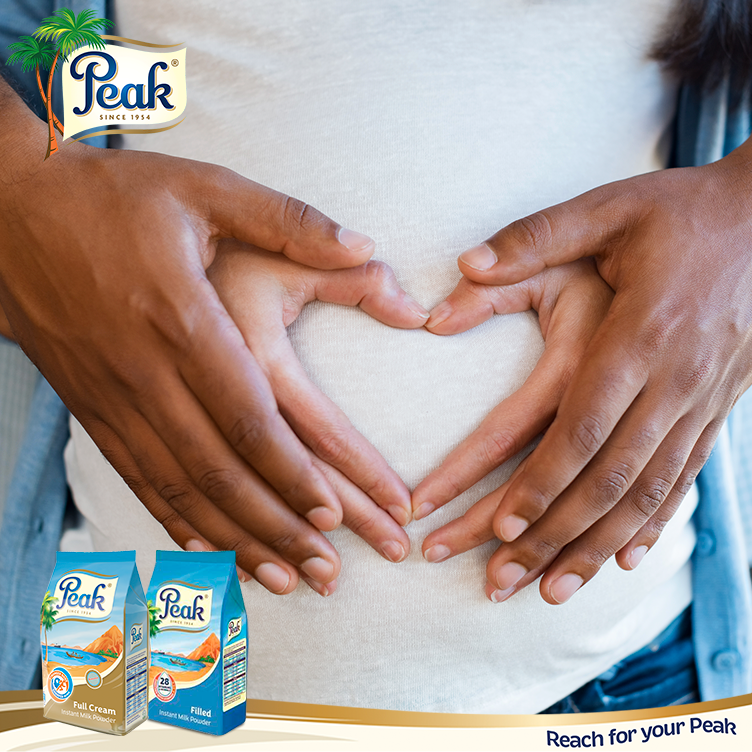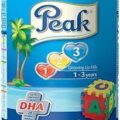To maintain a healthy pregnancy, approximately 300 extra calories are needed each day. These calories should come from a balanced diet. A healthy, well-balanced diet can also help to reduce some pregnancy symptoms, such as nausea and constipation. As you probably know, your body goes through lots of physical and hormonal changes during pregnancy.
To fuel yourself and your growing baby, you’ll need to make great food choices from a variety of sources. Eating a healthy, balanced diet will help you feel good and provide everything you and your baby need. The food you eat is your baby’s main source of nourishment, so it’s critical to get all of the nutrients you need.
What is Peak Milk?
Peak Evaporated Milk is a rich and creamy milk that is fortified with 28 Vitamins and Minerals. Peak Milk Powder is also rich and fortified with 28 Vitamins and Minerals. Peak Milk Powder is made of the most delicious pure cow’s milk. Peak Whole Milk Powder has a rich and creamy taste and contains important nutrients like Calcium, Protein and Vitamin A. It is a natural product, does not contain any preservatives and dissolves easily in warm and cold previously boiled water.
In addition to making a milk drink, Peak Milk Powder can also be used for cooking, baking and with cereals. Peak Milk Powder is packed in convenient re-closable tins and has a shelf life of 24 months when stored correctly. Peak Milk Powder is also available in pouches and sachets.
Benefits of Drinking Milk During Pregnancy
There are mixed opinions when it comes to including milk and other dairy products in a pregnancy diet, but milk can be very beneficial for you during pregnancy. It can offer you a host of nutrients that you will need for the healthy development of your baby. So, find out why we are insisting on including this wholesome drink in your diet.
- Milk is highly nutritious and is a vital source of calcium and vitamin D for women during pregnancy. And do you know why you need Vitamin D during pregnancy? According to a study, getting enough Vitamin D during pregnancy can lower the baby’s risk of developing allergies in future. Apart from this, pregnant women also need between 1000 and 1300 mg of calcium every day to nourish their body and the body of their developing baby. Drinking milk during pregnancy can meet some of your calcium requirements. You can take calcium supplements suggested by your doctor and drink milk daily to meet your calcium requirements.
- Drinking milk during pregnancy can also have growth-promoting effects in the foetus and it can help the baby grow tall. The baby may also have higher levels of insulin in his blood during the late teens which can lower the risk of type 2 diabetes.
- Milk is rich in protein, amino acids, and fatty acids – all of which are essential for the development of the baby’s nervous system. Being rich in calcium and iron, milk helps in the formation and development of the bones of the baby and to transport oxygen to the baby. Milk also has all the necessary A, B and D vitamins required for the intrauterine foetal development.
- Milk acts as an effective antacid that can ease heartburn and other gastric ailments, that are a common problem during pregnancy.
- The iodine content in milk has been shown to enhance foetal brain development and increase the IQ of children.
- Milk consumption in pregnancy is also linked to a lowered risk of diseases such as multiple sclerosis, neonatal rickets, and osteoporosis.
What Are the Different Types of Milk You Can Choose From During Pregnancy?
When the different types of milk are processed, their fat and calorie content change. A woman’s diet and body type during pregnancy will determine whether a type of milk is beneficial for her or not. Here are a few types of milk you can choose from:
Whole Milk
Whole milk contains extra fats and nutrients that get removed in the skimming process. A cup of whole milk contains about 5 g of saturated fat and 149 calories. Whole milk is ideal for you and will be recommended if you are not overweight and enjoy drinking full cream milk. SEE: List of Skimmed Milk Brands In Nigeria
Pasteurised Milk
Pasteurisation is the process where milk is heated on a high temperature to destroy pathogens and enzymes that spoil the milk when it is in storage. Whenever you opt for whole milk, you must make sure that it is pasteurised to prevent the chances of any serious diseases. If you enjoy drinking cold milk, then make sure it is pasteurised before you drink it.
Raw Milk
Raw milk is basically unpasteurized milk. It often contains a host of infectious pathogens, unnecessary enzymes, and pus cells from the cow. If your only source is raw milk, then make sure it is boiled and cooled or consumed as hot milk.
Nutritional Facts of Different Types of Milk
Not all women prefer the same type of milk and not all need the same level of nutrition when the rest of their diet is taken into account. For example, vegans would prefer non-dairy and organic milk from plant sources and some might just go with the taste. So choose the type of milk that best suits your nutritional need. MUST READ: Is Peak 123 Milk Good for Babies ?
Milk To Avoid During Pregnancy
While milk is generally considered a healthy food choice for pregnant women, there are some types of milk that are best avoided during pregnancy. Here are some types of milk to be cautious of:
- Unpasteurized milk: Raw or unpasteurized milk may contain harmful bacteria such as Listeria, Salmonella, and E. coli, which can cause food poisoning and lead to miscarriage or stillbirth. Therefore, it is recommended that you avoid consuming unpasteurized milk during pregnancy.
- Raw goat’s milk: Although goat’s milk is considered nutritious, raw goat’s milk may contain harmful bacteria that can cause foodborne illnesses. It is best to avoid drinking raw goat’s milk during pregnancy.
- Flavored milk: Some flavored milk products may contain artificial sweeteners, high fructose corn syrup, or other additives that may not be safe for pregnant women. Check the label for any potentially harmful ingredients before consuming flavored milk products.
- Full-fat milk: While milk is a good source of calcium and other nutrients, full-fat milk contains a high amount of saturated fat, which can contribute to weight gain and increase the risk of gestational diabetes. Low-fat or skim milk is a healthier option during pregnancy.
- Soy milk: While soy milk is a popular alternative to dairy milk, it contains high levels of phytoestrogens, which may affect hormonal balance during pregnancy. Some experts recommend limiting soy intake during pregnancy, while others suggest it is safe in moderation.
As always, it is best to consult with your healthcare provider regarding your specific dietary needs during pregnancy.








